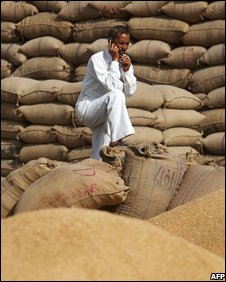Prabhupada, October 19, 1975, Johannesburg: […] What is that economical progressing? So that means busy fool. Fool, they do not know how to satisfy the economic problem. That is recommended in the Bhagavad-gita, annad bhavanti bhutani: You grow food grains. Then all economic question… But why you are not producing food grains? Why you are producing iron stools and instruments and motor and tire and collecting petrol far away from Arabia? That is… Krishna never says that “You do all this nonsense.” He said, “Grow food grains.” Why don’t you do that? That means fools. After all, you have to eat. So you are not busy in growing your food, but you are busy in producing tire tubes, motor cars, stools and instruments. Then how you will get your food? Where is your economic? First economic is, first necessity, you must eat. Full Conversation

New York Times: “Not a Food Crisis”
Published: September 12, 2010 — Russia’s misguided decision to ban exports of wheat for the next 12 months has sent a destabilizing shock through agricultural markets, pushing prices of grains to their highest levels since 2007 and 2008, when food shortages sparked rioting around the world.
The situation in poor grain-importing countries in Africa is tense. In Mozambique, the government backtracked on its decision to raise bread prices by 30 percent after riots in which more than a dozen people died. Still, the world need not experience another food crisis.
This year’s cereal harvest was the third largest on record, according to the United Nations’ Food and Agriculture Organization. Cereal stocks are at their highest point in eight years. Though drought in Russia and other big wheat producers like Australia is likely to reduce output, wheat stocks should remain substantially above two years ago, when they plunged to their lowest levels in three decades.
The danger is that misguided policies could still produce a food shortage. The ban on wheat exports announced by Russia, the world’s fourth-biggest exporter, pushed prices way above what its drought would justify. Importing nations scrambled for other sources of supply.
Russia magnified the effect by asking Kazakhstan and Belarus to impose their own bans. If other big agricultural producers were to follow Russia’s example, they would worsen market instability and help spread hunger.
Russia should learn from the last food crisis, which was caused in part by a jump in demand by the biofuels industry and rising demand in developing countries. But it was exacerbated when about 30 countries imposed restrictions on the export of agricultural products. Importing countries stockpiled food, further reducing supplies.
This year, in India, which has had a wheat export ban for the last three years, a bumper crop has led the government to stockpile. Press reports say the grain is rotting in storage. Hoarding, by exporters and importers, will only increase prices further.
The concerns in Russia about its grain supplies are understandable, but it could still buy at reasonable prices on world markets — if it and other big food exporters agreed not to impose controls. That would help return stability to the markets, where countries could make up any temporary shortfalls.
The Food and Agriculture Organization will meet on Sept. 24 to discuss the volatility in grain markets. Some of the causes — like climate change — do not lend themselves to easy solutions. But if the agency could broker an agreement not to impose export controls, it would go a long way toward protecting food security.








Speak Your Mind